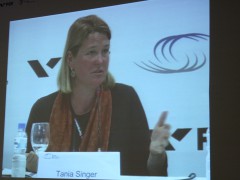2084: Defeated Economic Man
The following article deals with the topic “Mental Training towards a Caring Economy,” which is currently being discussed at the Global Economic Symposium in Rio. The author intends to enrich the discussion at the symposium with her personal stories and ideas.

Neuroscientist Tania Singer discusses the effects of mindfulness practices on the development of the brain | Photo by the author
Reason distinguishes humanity from other animals. Is it possible to imagine a scenario where we overcome the “Economic Man”? For the speakers, it is just a matter of culture, of narrative. If we look at the history of countries like India, Brazil and even England, we find out that completely different values can predominate and that much more value can be placed on community work and cooperation. Although it is usually considered absolutely essential that corporate leaders have a sense of “Self,” (even if that implies some narcissism) maybe even a pathological one, this way of living usually brings extreme anxiety to people in general. Can this be changed?
One example of how all this could start would be self-compassion. Our current society values exclusively the best, which means valuing mainly ego. This can only lead to frustration for millions of individuals as only a few can occupy this special position. But self-compassion is a different thing. It is actually a skill that we can train, like math, piano or tennis. One example is the following. As kids have more brain elasticity than adults, one experiment for developing this new ability was done with a class and showed positive results in only three weeks and even better ones in five. But good results are founds in adults, too.
The point is that we do need time to introspect. It is like they are proposing a mental gym to facilitate a way of caring for our mental health. It really makes sense: why do we care so much about appearance and so little about understanding ourselves? After all, we do live with ourselves 24 hours a day. Usually, people don’t learn how to look into their minds where “lots of me’s” can be found. It takes time to do that. . . .
This is what is called “mindfulness,” quite an innovative science and practice, and a contemplative one. It is supposed to induce better social behavior and develop more compassion. The audience was touched. Someone even said it was the only panel that really touched the core of the problems we are dealing with in the other sections, financial, educational and security-related. If the members of one society don’t have the cognitive capacity to deal with these issues, then we together will not be able to overcome these different types of crises.
How do we make this change? How does one reflect about all of this at a policy-maker level?
It would imply massive changes with political implications. The speakers did not present answers but pointed out that change has been accomplished mainly in health care, centered primarily on scientific studies that have been done in this area. What about education and the economy? They have no idea how these changes are going to happen. In their opinion, society underestimates the aspirations of people to get there and build relationships based on compassion. This is actually happening through thousands of gestures by thousands of people every day. Unfortunately, the media gives more attention to murders.
We need solutions that help to surpass the differences between thinking and feeling. In the end, what matters is that you have to be the change you want to see in the world. I always have myself with me.


